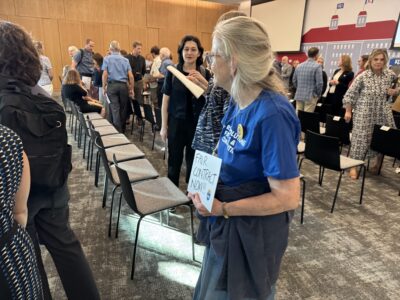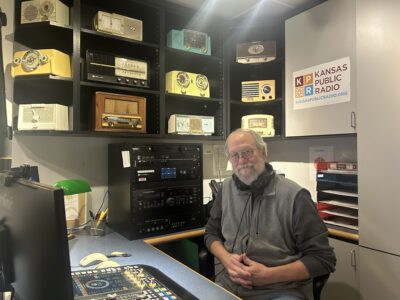Science on Tap events at Free State Brewing help KU researchers connect with the community at the beer hall, not the lecture hall

photo by: Contributed/Photo by Natalie Vondrak
Sharon Billings, University Distinguished Professor in the Department of Ecology & Evolutionary Biology and Senior Scientist at the Kansas Biological Survey & Center for Ecological Research, discusses her research on how mountains around the world are changing as the climate warms at Science on Tap in September 2024.
Any college student can give a ready excuse for not showing up at a lecture hall. Maybe they missed an alarm for their 8 a.m. class. Maybe some particularly nice weather beckoned them outdoors instead. But what if the lecture was held in a beer hall?
That idea was first brewed 15 years ago, said Chuck Magerl, the proprietor of Free State Brewing. Magerl was serving on the board of directors for the University of Kansas’ Natural History Museum when he was approached by its longtime director Leonard Krishtalka. That led to the first Science on Tap event at Free State Brewing in January 2010, when KU researchers like Krishtalka could come “off the hill” and into the community to share their knowledge and research.
Fifteen years on, the events are still going strong. Wednesday night, the KU Biodiversity Institute will host its last Science on Tap event of the spring semester at 7:30 p.m. at the brewery, 636 Massachusetts St. The event will feature a presentation from Sarah Lamm, a fourth-year Ph.D. candidate in KU’s Department of Geology, about her research with NASA’s Mars Rover program.
Natalie Vondrak, the communications coordinator for KU’s Biodiversity Institute and Natural History Museum, which hosts the events, said the institute has about eight of the Science on Tap events a year, with an average of around 75 people coming each time.
Vondrak said the bulk of the speakers come through the Biodiversity Institute, but presenters have participated from many different departments, including the Department of Ecology and Evolutionary Biology, the Kansas Biological Survey & Center for Ecological Research and the Astronomy and Physics Department.
The events themselves are pretty informal; typically, there’s a 40-minute presentation, then a 20-minute question-and-answer session about the talk. The brewery atmosphere makes the science talks feel more approachable and helps the community connect with the university.
“It’s nice to get off the hill and talk with the community … to remind people in this town of all the incredible research happening at KU,” Vondrak said.

photo by: Contributed/Photo by Natalie Vondrak
Audience members at Science on Tap at Free State Brewing, 636 Massachusetts St., in March 2025, featuring Herpetology Curator Richard Glor at the KU Biodiversity Institute and Natural History Museum. Natalie Vondrak, the communications coordinator for KU’s Biodiversity Institute and Natural History Museum which hosts the events, said they usually get around 70 people at the talks, with people driving in from Topeka or Kansas City.
Magerl said that was exactly the hope behind the idea. The best talks, Magerl said, are less like a lecture and more like you’re talking to an expert at a dinner party. Additionally, he thinks the forum can be mutually beneficial: Not only do residents get to learn about the research going on, but high-level researchers get exposed to simple questions like “why?” — which can improve the way they communicate about science to nonexperts.
“It’s more conversational, more interactive. That is advantageous not just to the community members but also the presenters,” Magerl said.
A few talks have been a little outside his reach, he admits — for example, research about dark energy and the limits of the universe might go over his head — but for his work as a brewer, research about microbiology or discussions of the water system of the Great Plains and how aquifers are being impacted hit home.
“It is valuable for those of us in the public to have some awareness of the research that occurs and the people engaged in that research here in Lawrence,” Magerl said.
And people have responded well to the events, Vondrak said. She began to notice regulars who show up to multiple events and has talked with people who have driven in from Topeka or Kansas City “just to attend the talk.”

photo by: Contributed/Photo by Natalie Vondrak
Andy Bentley, Ichthyology Collection Manager at the KU Biodiversity Institute and Natural History Museum, explaining how the museum’s natural history collections are used to study the interactions between fauna and their environments at the November 2024 Science on Tap event. The Science on Tap events have been going on for 15 years at Free State Brewing, with the idea of helping share KU’s research with the greater community.
Vondrak said one of her favorite events of the year happened in November 2024, when Andy Bentley, the Ichthyology Collection manager at the KU Biodiversity Institute and Natural History Museum, gave a presentation about why museums collect specimens for research. Vondrak said most of the public sees museums as “static” because they just see what’s in the exhibits, but there’s so much activity behind the scenes that can help graduate students with research and add to the collective knowledge in a field. Bentley’s talk provided a enlightening overview, she said, of how a museum’s mission is far broader than creating public displays.
Although this event will be the last before a brief break, Vondrak said Science on Tap would keep chugging. Last summer, Vondrak said the group hosted a series with events in June and July. She’s not sure if that will happen this summer, but a series will definitely be happening in the fall.
The free Science on Tap event will be at Free State Brewing from 7:30 to 8:30 p.m. Wednesday. More information about the event can be found at KU’s website.







